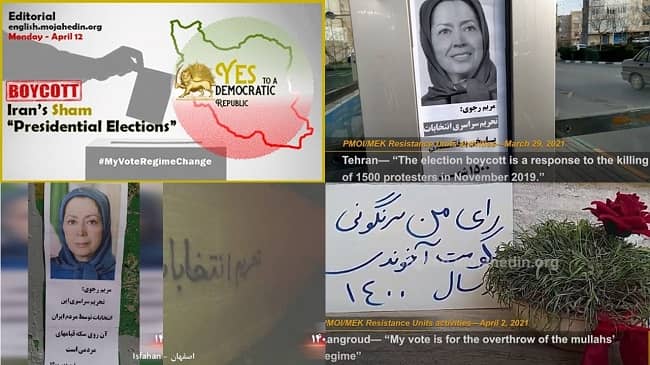The upcoming Iranian presidential elections in June are “very important both domestically and internationally”, according to supreme leader Ali Khamenei, no doubt because of the domestic and international crises faced by the regime, which needs the legitimacy of these elections to maintain power.
The ongoing protests in Iran could turn into a nationwide uprising at any moment, just as happened on three previous occasions in the past four years, with people calling for regime overthrow. To give you an idea, one previous popular slogan was “For 40 years we shed bloodied tears, enough is enough, we’ll take a stand”.
The Iranian public has roundly rejected the mullahs and all they stand for, as was visible during the 2020 parliamentary elections, which proved humiliating for the mullahs on the world stage, despite their claims to the contrary. Now, the regime fears that this will happen again.
So much so that last month, Khamenei urged Iranians to take part by blaming their apathy on foreign interference and describing voting as an act of “national unity”. Of course, shortly after this speech, pensioners who have been gathering in protest for weeks said that they would not vote because it had never brought justice.
And that is true. Voting under this regime will never bring justice. It can’t because there is no other party – the moderates being just the mullahs trotted out to make the regime more appealing to Westerners – so what is the point in voting if nothing will change? Far better to call for change from the streets than cross your fingers and hope that the moderate President Hassan Rouhani won’t send troops to slay protesters during the next uprising, as he did in the November 2019 one.
Even Khamenei abandoned the idea of having an actual choice in the running of the country, as he said that the next president should be “jihadi and revolutionary”, which pretty much tells us all we need to know because all candidates must first be vetted by the Guardian Council, appointed by Khamenei, to ensure they are loyal to the Supreme Leader.
The known candidates in the election are:
- former Vice President of the Parliament Ali Motahari
- former MP Mohsen Rahami
- former Minister of Petroleum Mohammad Gharazi
- former minister Mohammad Abbasi
- head of the Revolutionary Guards (IRGC) Khatam Al-Anbia garrison Saeed Mohammad
- former Defense Minister Hossein Dehghan
- member of the Office for Strengthening Unity Seyed Abbas Nabavi
- former head of regime’s broadcasting Ezzatollah Zarghami
